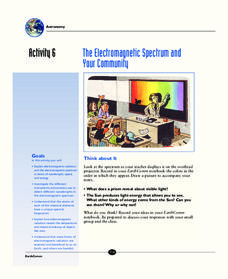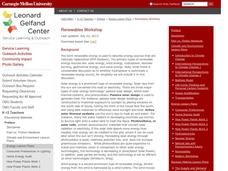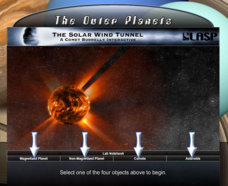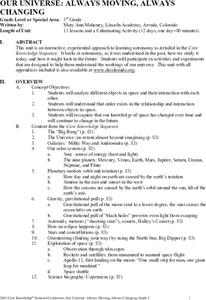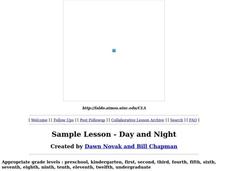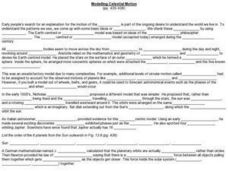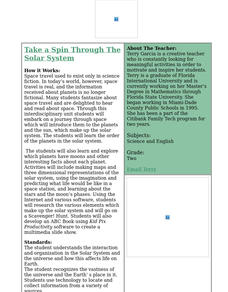Mr. Hill's Science Website
Solar System Fact Sheet
Here is a fantastic, educational handout packed with information and facts not only about the planets in our solar system, but also regarding major moons and their surface features, dwarf planets, comets, and asteroids.
University of Colorado
Clay Planets
Why do scientists use models? In the first installment of 22, groups create scale models of our solar system. They then share and discuss their models.
It's About Time
The Electromagnetic Spectrum and Your Community
Do you have blossoming astronomers who seek to understand the electromagnetic spectrum? Assist them with exploring electromagnetic radiation and the electromagnetic spectrum as the class conducts various activities to demonstrate...
Carnegie Mellon University
Renewables Workshop
Youngsters examine resource maps to find out which states are using solar and wind power and discuss as a class various other renewable energy sources. They use a provided data table to record pros and cons to each technology, build and...
Curated OER
The Atmosphere
Here is a suitable set of slides to use when teaching about the layers of the atmosphere, climate, global winds, and types of clouds. These slides will support a few different lectures. You will probably want to replace the diagrams with...
UAF Geophysical Institute
Carbon Footprint
Your young environmentalists can calculate their carbon footprint and discuss ways to reduce it with a worksheet about climate change. After reading a handout about what impact one's carbon footprint can have on the environment, kids...
Sunburst Visual Media
Clouds
Support science instruction with a combination of engaging activities and skills-based worksheets that focus on clouds. Learners take part in grand discussions, write an acrostic poem, complete graphic organizers, solve word...
National Wildlife Federation
What's Your Habitat?
How are third graders like rabbits? They both live in habitats and require food, water, and shelter to survive! An educational science activity encourages your learners to think about their own habitats and survival needs, before...
Laboratory for Atmospheric and Space Physics
The Solar Wind Tunnel
The winds of change are blowing in our very own solar system! But what makes some heavenly bodies more affected by solar winds than others? Pupils discover the concept of magnetic forces at work in space in this...
NASA
Taking Apart the Light
Break down light into spectra. Scholars learn how atoms emit and absorb photons and come to understand how this process allows scientists to identify different atoms based on either absorption lines or emission lines. Learners then...
NASA
Evaluating a Lunar Eclipse
Do all lunar eclipses look the same? Find out in an activity where astronomers use the Danjon Scale of Lunar Eclipse Brightness to describe the color and brightness of the moon during an eclipse. Explorers make three observations using...
K20 LEARN
Let's Lasso the Moon: Phases of the Moon
A timelapse video hooks learners' attention to the phases of the moon. After discussing their observations, pupils use the Moon Giant website to view the moon on their birthday and complete a bar graph. The class creates an anchor chart...
Curated OER
Lesson Plan # 1 - Phases of the Moon
Students explore and identify moon phases, watch teacher demonstration of different phases using globe and flashlight to represent moon and sun, and discuss reasons why there are moon phases.
Curated OER
Moon Shadows
Students study the moon and its shadows. In this moon instructional activity students complete a lab activity that shows the different shadows and answer questions.
Curated OER
Retrograde Motion
Students study the motions of the heavenly bodies. In this space lesson students use models to show a variety of schemes explaining the motions.
Curated OER
Our Universe: Always Moving, Always Changing
Students explore the main concepts of astronomy through the eleven lessons of this unit. The past, present, and future methods of studying the science are examined in this unit.
Curated OER
Day and Night
Pupils discuss why day and night occur after visualizing a teacher-led demonstration.
Curated OER
Modeling Celestial Motion
In this modeling celestial motion worksheet, students fill in the blank about the motion of celestial bodies: planets and stars. Students complete the blanks with information about the scientists and philosophers responsible for early...
Curated OER
You Can Die Here
Students examine Death Valley including the amount of precipitation and winds that it gets. In this climate based lesson students explain the reasons for the amount of precipitation and windward patterns in Death Valley.
Curated OER
Take a Spin Through the Solar System
Second graders participate in a variety of activities to explore the Solar System in this unit.
Curated OER
Solar System
In this solar system, students review information about the planets found in our solar system. Students complete 15 fill in the blank questions and then find the 9 planets in a word search.
Curated OER
Mississippi’s Contribution to Space Exploration
Eighth graders engage in a class discussion while going through a PowerPoint on Mississippi's contribution to space exploration. In this Space science lesson plan, the students will also participate in Brain Pop quizzes where they will...
Curated OER
Exploring Meteorite Mysteries: Building Blocks of Planets
Students simulate the formation of chondrites and asteroids. In this astronomy lesson plan, students demonstrate accretion using balloons and static electricity. They compare and contrast their models to the actual process of chondrites...
Curated OER
A Wild Chain Reaction
Students explore habitats. In this habitat lesson, students break into groups and are labeled as a part of a habitat. Students then do an activity with yarn that shows how all of the parts are connected and depend on each...
Other popular searches
- Earth Moon Sun System
- Earth Sun and Moon
- Earth/sun/moon
- Earth and the Sun
- Earth, Sun and Moon
- Earth and Sun
- Earth Moon Sun
- Earth Rotation Around Sun
- Earth and Moon and Sun
- Earth Orbit the Sun




